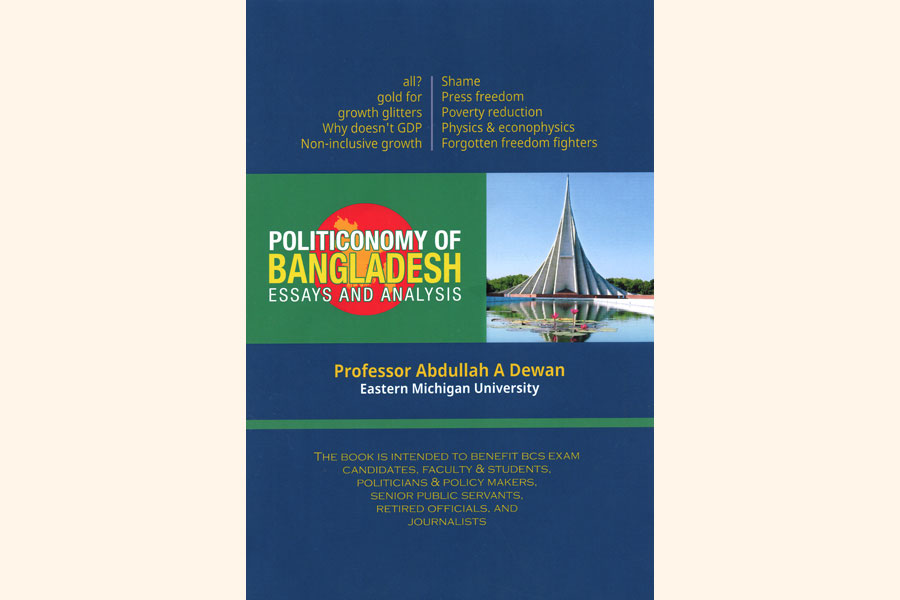
Published :
Updated :

At long last a must-read book titled as Politiconomy of Bangladesh by Professor Abdullah A Dewan has landed on the soil of Bangladesh. The book is a compilation of newspaper columns about Bangladesh economy and political spectrum. Professor Dewan teaches at the Eastern Michigan University in the US. Formerly a physicist and a nuclear engineer at Bangladesh Atomic Energy Commission, he received his B.Sc. (hons) and M.Sc. (phys) from Dhaka University, M.S. (nuclr tech) from Islamabad University, M.S. (nuclr engr) from North Carolina State University in 1980 and Ph D (econ) in 1985 from the University of Kentucky, Lexington, Kentucky, USA.
Professor Dewan has published numerous research articles in scholarly economic journals. For example, he has published three articles in the Review of Economics and Statistics (Harvard University Journal). He has, to his credit, published over 550 newspaper articles in several Bangladesh English newspapers (2005-2024) on domestic, U.S. and global economic and geopolitical issues of popular interests. Over the years since 1987, he has presented seminars and organised monetary policy workshops at Bangladesh Bank. Professor Dewan’s teaching interest beholds a wide range of down-to-earth basics including, macroeconomics, microeconomics, international trade and finance, money and banking, monetary theory and policy, econometrics, time series analyses and forecasting.
Based on the contents of diverse areas, one can fairly assess that the book is one of its kind. With his academic pedigree in physics, nuclear engineering, and economics, Professor Dewan is uniquely qualified to produce such a book that includes multi-faceted issues in multi-disciplinary areas focusing Bangladesh.
The book consists of 91 articles, grouped in 14 chapters, based on semantic similarity of issues and topics. The articles in chapters on Good Governance, Politicians and Political Goods, Monetary Policy, Inflation, Interest Rates and Productivity Growth, Poverty Reduction, Press Freedom and Economic Performance, Religion & Economics, Science & Economics are indeed time invariant and enlightening to every reader regardless of political affiliations. I find in-depth analysis of these issues as unique – in terms of presentation, captivating the interest and attention of the readers.
In the book’s preface the author has given a brief picture of his articulation in a high scholastic way. He writes, “With exponential technological changes, our world is becoming more and more complex. We need polymath skills – one with multi-disciplinary insights to solve intricate problems. For example, the climate change dilemma is not simply an environmental science issue; it requires inputs from diverse fields such as economics, sociology, physics, engineering and of course, policy makers. Becoming a polymath requires strong motivation to read and learn, and the inertia to develop skills for inter-disciplinary problem-solving.
The path to becoming knowledgeable in multidisciplinary areas is to stay intriguing and questioning and be edified by diverse subject areas. Try not to pass up something that piques your interest and curiosities. Stay inspired. Never be discouraged or frustrated. The future is unknown and unknowable. No one can predict where you will land, what you might become, or what you will achieve. The writer of this book is an example of that fait accompli. ”
The collections of articles in this book are selected carefully to be politically neutral, content-rich, and coherent in policy analysis and, of course, time invariant. There are a few articles that date as far back as 2005. A persuasive rationale for looking backward is that the events and analysis of the yester years are deemed equally time invariant given the persistence of confrontational political culture, religio-political muddle, unabated corruption, suppression of press freedom and so on. The noticeable difference between then and now, according to the writer, “is the emergence of new breeds of politicians and activists with the mindset of their dead and aging antecedents.”
Although his newspaper articles were originally intended for opinion column readers, they are now “repurposed for a much wider body of readers.” The book begins by showcasing the main characteristics of Bangladesh’s political economy and the society, demonstrating the political, economic and social patterns that took up the anomalous course of the nation’s history since its bloody birth through an earth-rocking Liberation War in 1971.
The book is a well-structured politico-economic glossary of Bangladesh. In my assessment, this book would be of much interest, especially to the BCS exam candidates (for essay writing on various national issues), Bangladesh Bank executives, university faculty and students, researchers, opinion builders, politicians and policy makers, journalists, retired officials, and of course, general readers at large. University faculty of various disciplines can use the book for classroom lectures and discussions, while journalists can use the book for writing specifically on the country’s economic issues.
Finally, I could not agree more with the writer’s claim : “My sincere feeling is that for some people the book would be one of curious reading interest; and for others a pastime reading companion on one’s travel to vacations, breakfast table gossips, a show of tell trophy on one’s office desk, or may even occupy one’s bedside table for a leisurely eyeballing of some articles, serving as ‘melatonin’ for sleep inducements.”
Khondoker Hasnat Karim Pintu, is Columnist & Documentary Filmmaker.
hasnatkarimpintu@gmail.com


 For all latest news, follow The Financial Express Google News channel.
For all latest news, follow The Financial Express Google News channel.